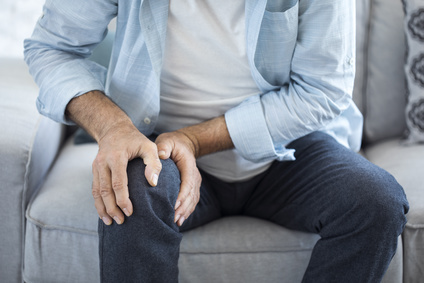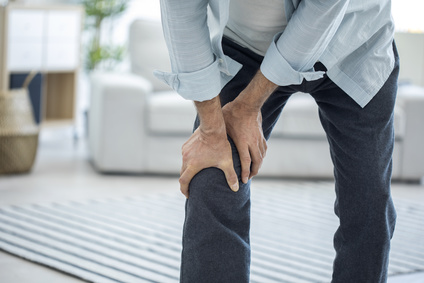Experiencing chronic discomfort and pain in one or both of your knees? Noticing a new sound or sensation of weakness in your knee when flexing and bending your leg? You may be putting off a trip to the doctor because the “pain isn’t so bad” or you simply don’t have the time, but your delay could be the wrong choice.
Ask yourself:
Am I avoiding bearing weight on this leg?
 Is your knee pain leaving you limping or avoiding bearing weight? This seemingly harmless way of favouring one leg over the other may become the norm for you, but could potentially be making matters worse. Not only is knee pain that prevents you from fully using your leg dangerous to your overall health by inhibiting activity levels and altering your gait and posture, but using a leg with an untreated knee injury, like a strained meniscus, could worsen an underlying condition.
Is your knee pain leaving you limping or avoiding bearing weight? This seemingly harmless way of favouring one leg over the other may become the norm for you, but could potentially be making matters worse. Not only is knee pain that prevents you from fully using your leg dangerous to your overall health by inhibiting activity levels and altering your gait and posture, but using a leg with an untreated knee injury, like a strained meniscus, could worsen an underlying condition.
Does my knee feel weaker than normal?
Noticing your knee “giving out” more when you are physically active? This repetitive weakness could be more than just an indication that you need to strengthen your leg muscles. Weakness and tightness in connective tendons and ligaments in the knee could make you more susceptible to injury or developing arthritis in the knee joints.
Can I hear any sounds when I bend my leg?
 A crunching or popping noise in your knee when you’re moving or bending your leg could indicate a hidden injury or condition, especially when the sounds are accompanied by acute pain. While painless popping could simply be un concerning gas bubbles, a painful popping, clicking, or crunching sound may be the result of a torn ligament or a tear or rubbing of worn down cartilage in the joint.
A crunching or popping noise in your knee when you’re moving or bending your leg could indicate a hidden injury or condition, especially when the sounds are accompanied by acute pain. While painless popping could simply be un concerning gas bubbles, a painful popping, clicking, or crunching sound may be the result of a torn ligament or a tear or rubbing of worn down cartilage in the joint.
Is there swelling on or around my knee?
Inflammation and swelling of the knee joint represent a myriad of potential injuries including bursitis in the knee, a torn MCL or ACL, tendinitis, gout attack, osteoarthritis, and rheumatoid arthritis. While temporarily applying ice packs to your knee can aid the swelling, scheduling time to seek a medical evaluation as soon as possible is key.
Are there any noticeable bulges or deformities on or around the knee?
While strains, tears, and breaks are most commonly thought of when discussing knee pain and injury, there are growths that can develop when certain illnesses or conditions are present. These may include bone cancer which causes tumours to grow in the bones of the knee or a buildup of synovial fluid in the joint which causes cysts to form.
Does my knee lock up or catch when I stand or walk?
 Where your thigh bone (femur) meets the leg bone (tibia), the knee forms with a knee cap (patella) sitting on top, ligaments holding all the bones together, and two cartilage cushions on either side of the knee called menisci. If one of these menisci becomes torn, it can move or dislodge a piece into part of the knee it shouldn’t be in. This can cause the knee to lock up and make it hard for you to bend or flex your leg. If this sounds like you seek medical attention right away.
Where your thigh bone (femur) meets the leg bone (tibia), the knee forms with a knee cap (patella) sitting on top, ligaments holding all the bones together, and two cartilage cushions on either side of the knee called menisci. If one of these menisci becomes torn, it can move or dislodge a piece into part of the knee it shouldn’t be in. This can cause the knee to lock up and make it hard for you to bend or flex your leg. If this sounds like you seek medical attention right away.
It is a common myth that knee injuries only happen to athletes in high impact sports. In fact, you could tear a meniscus by simply squatting, you could fracture a kneecap in a car accident, and even general wear and tear of ageing can put you at risk for knee injury.
Want to get a step ahead of potential knee pain? Experts recommend older adults especially:
Manage a healthy weight and balanced diet – being overweight and obese adds to the stress and strain placed on your internal joints, especially your knees
Wear proper fitting shoes – investing in a good, quality pair of shoes that fit well and aren’t worn thin can ensure your physical activity, from walking to hiking and running, is done in good form and supports strong knees
Stretch and strengthen knees – Flexible, pliable connective tissues in and around the knee will be more limber and able to support and stabilize the movement of your knee than stiff, tight tendons and muscles
Avoid high-impact activity if you’ve had an injury – when it makes sense, especially for older adults with previous knee injuries or operations, avoiding the risk of re-injuring vulnerable knee joints may come with focusing on low-impact exercises and activities
Don’t be brought to your knees by knee pain. Early, proactive detection and treatment of knee pain associated with an injury or illness can make a huge difference in your mobility and overall health down the line.









Helen Carter - 7 years ago
I’ve been using a Knee Support for a year now. It’s brilliant and works for me.
It was from an online store called Active 360 NZ or something like that